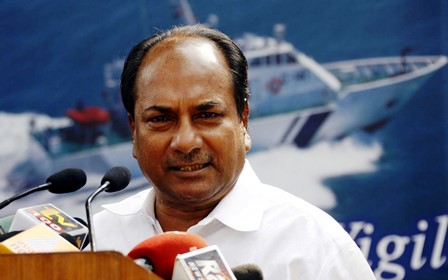The Congress-led United Progressive Alliance (UPA) does not appear to take the resignation of Admiral D.K. Joshi seriously. The navy chief had put in his papers, taking “moral responsibility” for a major mishap on kilo-class submarine INS Sindhuratna off the coast of Mumbai. The ruling coalition’s casualness to the unprecedented event—a serving military chief resigning—is not surprising, for the UPA doesn’t give a hoot to either morality or responsibility, certainly not to national security.
Defence Minister A.K. Antony displayed a nonchalance that is a characteristic of the Sonia Gandhi regime to any serious issue. His reaction was typically insipid and inconsequential: “I am very sad about the whole development. Admiral Joshi met me yesterday [February 26] and handed over the resignation letter and requested me to accept the letter with immediate effect, so I consented to it.”
As if he were consenting to some trivial official matter.
Perhaps Anthony and other Congress worthies saw a scapegoat in Joshi—hence the prompt acceptance of the resignation. Antony had reportedly severely reprimanded Joshi after the incident, almost trying to show that the Navy chief alone was responsible. “If the chief resigns, it suits everyone,” a former Navy chief, Admiral Arun Prakash, told IANS. Perhaps the people of India would forget the incident and its root cause—the government’s inability to keep upgrade weaponry.
Thankfully, the media and defence experts did not like the pro-forma reaction of the government. News reports were scathing of the minister as well as the Establishment. That this was the sixth major mishap in the past eight months under the Western Naval Command was properly highlighted. It was pointed out that in August 2013, INS Sindhurakshak had sank off the Mumbai harbor and killed 18 navy personnel, including three officers, on board. The state of military preparedness in terms of weapons and hardware was also duly emphasized. Further, the responsibility of government was underlined.
“The Ministry [of Defence] should also take responsibility and take remedial measures,” Prakash said. He wants “greater involvement” in the functioning of the armed forces. “At the moment, they are quite far apart. In spite of the recommendations of various task forces, their dealings are only through letters and files.”
C. Uday Bhaskar, distinguished fellow at the Society for Policy Studies, was also anguished about the lack of political and bureaucratic accountability, and the desire to heap blame on Admiral Joshi. “…does the buck stop there [his resignation]? There are many issues on which the ministry has developed cold feet. For 20 years, we have been saying we need new submarines.” To little avail.
Rear Admiral Raja Menon (Retd.) expressed dismay at the slow speed of the armed forces’ modernization programmes: “There is also the question of why we are running such old submarines. This one was 26 years old. This is because we have a defence minister that took six years to finalize the Scorpene project and once having done so, delayed it another three years. That’s a delay of nine years and is certainly not acceptable.”
But it is acceptable to the minister who loves to spar with military chiefs and tries to uphold the most dangerous socialist dogmas in the area of defence production. Unsurprisingly, the MoD remains mired in statist swamps.
“The health of the ministry is not receiving the attention it should, and so we have eruptions like this. This is an opportunity for a holistic review of all that ails the military,” Bhaskar said.
“Holistic review”—a nice term but of no use for the political class. I stress the political class, and not just the UPA. It is indubitable that the Congress-led regime is the most corrupt, incompetent, and self-serving this country has ever seen in the last couple of centuries, but politicians outside the ruling alliance can scarcely be absolved of their responsibility. When the Bharatiya Janata Party (BJP) was in office for six years (1998-2004), it did little to improve the situation; had it done anything substantial, institutionalized ministerial and bureaucratic responsibility in matters related to national security, and streamlined defence procurement, there would not have the kind of mess that we witness today.
Two persons responsible for the continuation of the apathetic mindset towards national security during BJP rule were Prime Minister Atal Bihari Vajpayee’s principal secretary and National Security Advisor Brajesh Mishra and the quisling, Sudheendra Kulkarni. The dirty duo ensured that Congress-style defence and foreign policies continued while Vajpayee was in office. Mishra is also said to have provided a crucial service to the Gandhi family, for which he was duly rewarded Padma Vibhushan in 2011.
If Narendra Modi comes to power in the forthcoming general elections, he has to ensure that nobody who has imbibed the treacherous ideas and ideals of the ancien regime is allowed to shape policy in the country. We have had enough of Nehruvian socialism, its shibboleths, and their consequences. It is time for change. For the sake of military preparedness, the lives of our soldiers and citizens, indeed for national security and sovereignty.
Ravi Shanker Kapoor is a journalist and author. He upholds freedom of expression, individual liberty, free market, and open society. He is an uncompromising opponent of Islamism, communism, and other totalitarian ideologies. He is also a critic of intellectuals, as evident from his third book, How India’s Intellectuals Spread Lies (Vision Books).

